|
|
|
Sort Order |
|
|
|
Items / Page
|
|
|
|
|
|
|
| Srl | Item |
| 1 |
ID:
186295
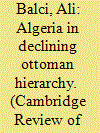

|
|
|
|
|
| Summary/Abstract |
The shattering Ottoman order in the early nineteenth century offers an intriguing puzzle about the behaviors of subordinates within declining hierarchical orders. While Greece, Egypt, and many other provinces challenged the Porte, Algiers preferred to remain within the Ottoman order. The puzzle turns into a riddle when considering that Algeria was bounded to the center in a loose way and uprising against the Porte was less risky and less costly. Why did a geographically remote and loosely integrated subordinate remain within the Ottoman hierarchical order at a time when well-integrated and geographically close subordinates, one after another, picked the challenge option? This paper proposes three factors, which may be more generally applicable to the clients of declining patrons: the inability of the Porte to force Algeria against its interests, which decreased the costs of continued allegiance; Algeria’s need for a balancer against threats from European naval powers, which the Porte provided; and the domestic political legitimacy that allegiance to the Porte also provided to Algeria’s rulers.
|
|
|
|
|
|
|
|
|
|
|
|
|
|
|
|
| 2 |
ID:
189390
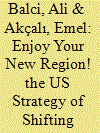

|
|
|
|
|
| Summary/Abstract |
Where does Turkey geographically belong, the Middle East or Eastern Europe? This was a looming puzzle for the architects of the Cold War to solve in the early 1950s. This was so because Turkey’s region would dramatically affect the composition of members in the UN Security Council. Although Turkey was elected to the Council from the Middle East region in 1950, it moved its region to Eastern Europe in 1953 to compete with Poland for the Council seat. However, the determination of where Turkey belonged was not an easy task and demanded very delicate calculations and political strategies. We argue that it was the Cold War strategies of the US that arbitrated where Turkey geographically belonged, exemplifying that regions are formed through discourse and are constantly mediated and renegotiated. This situation has created both opportunities and limitations for the Turkish policy-makers who joined the debate ex post-facto, spoke either to legitimise the US decision or to displace counter arguments.
|
|
|
|
|
|
|
|
|
|
|
|
|
|
|
|
| 3 |
ID:
145646
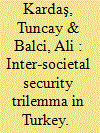

|
|
|
|
|
| Summary/Abstract |
This article examines the inter-societal security trilemma among political Islamists, Kurdish actors, and the state in Turkey with a special reference to the failures in the Kurdish Opening that was initiated in 2009. While the Kurdish question is undoubtedly a long-standing multi-state and multi-causal ethno-political phenomenon, this study is primarily concerned with the identity–security-politics nexus. It addresses the question of how the politics of identity and dynamics of contra-identity claims produce a persistent security dilemma among different political blocs in contemporary Turkey. Addressing this question helps to explain why the Turkish state has consistently failed to successfully tackle the Kurdish question, as was the case of the Kurdish Opening in 2009.
|
|
|
|
|
|
|
|
|
|
|
|
|
|
|
|
| 4 |
ID:
186855
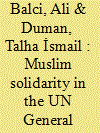

|
|
|
|
|
| Summary/Abstract |
In international politics, governments may tend to favor countries with which they share some degree of cultural affinity. Moreover, international organizations can strengthen solidarity among their members. Not surprisingly, Muslim countries, which came together under the umbrella of the Organization of Islamic Cooperation (OIC), frequently state that they pursue Muslim solidarity in international politics. By looking at voting preferences of OIC member Muslim countries in the UN General Assembly about the selection of nonpermanent UN Security Council members, this article aims to understand Muslim solidarity in international politics. For this, the article uses newspaper reports, political statements, secret intelligence reports, and interviews regarding the votes of Muslim countries in contested elections in which a Muslim country competed with its non-Muslim rival for the same Security Council seat.
|
|
|
|
|
|
|
|
|
|
|
|
|
|
|
|
| 5 |
ID:
095187
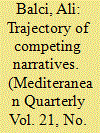

|
|
|
|
|
| Publication |
2010.
|
| Summary/Abstract |
The history of the "deep state"-also known as Ergenekon-in Turkey starts with the foundation of the modern republic. Although references to the deep state date back to an earlier period, this essay examines coverage of it in the Turkish media during the late 1990s and the early-twenty-first century. Ergenekon was conceptualized, debated, defined, and redefined by the media; it was brought to public attention by the media, not by state officials, the police, politicians, inspectors, or members of the organization. The author's intent is not to redefine Ergenekon yet again but to analyze the meaning of the organization Ergenekon, how that meaning is continually defined and redefined by the media, and how the facts related to Ergenekon are interpreted by the media.
|
|
|
|
|
|
|
|
|
|
|
|
|
|
|
|
| 6 |
ID:
177699
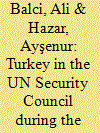

|
|
|
|
|
| Summary/Abstract |
Turkey served for five years in the UN Security Council during the early Cold War period. Throughout its service, first in 1951–1952, then in 1954–1955, finally in 1961, Turkey joined 201 voting sessions, and gave many statements on matters before the Security Council. The three electoral campaigns of Turkey for the temporary seat in the Council, and its voting and statement performance during a 5-year service are very informative not only about Turkey’s foreign policy but also about the behavior of small powers during the early Cold War period and the working of the Security Council, the most important international institution. Therefore, this article aims to provide a short story of Turkey’s election to and performance in the Security Council, analyze its voting preferences during temporary membership, and debate Turkey’s voting motivations.
|
|
|
|
|
|
|
|
|
|
|
|
|
|
|
|
| 7 |
ID:
073837
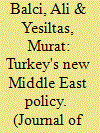

|
|
|
| 8 |
ID:
157108
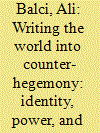

|
|
|
|
|
| Summary/Abstract |
This article is an attempt to develop a theoretical framework about how to study dissident ethnic movements’ foreign policies. Is it possible to speak about foreign policies of ethnic dissident movements, especially when it is considered that they have no characteristics of modern sovereignty such as territory and recognition? For example, do the Berbers in Morocco, the Catalans in Spain, the Balochs in Iran, and the Kurds in Turkey have a foreign policy? If they do, how do we study their policies toward the outside world? Specifically, focusing on the case of the Kurds in Turkey, this article attempts to provide a theoretical framework for how to study dissident ethnic movements’ foreign policy performances. By looking at the effect of the end of the Cold War on the Kurdish nationalists’ imagination of the United States, this article interrogates how the change in their imagination played a role in the construction and reconstruction of the post-1980 Kurdish identity in Turkey. It also draws on the work of poststructural and postcolonial Ernesto Laclau, David Campell, and Edward W. Said in order to develop the theoretical framework.
|
|
|
|
|
|
|
|
|
|
|
|
|
|
|
|
|
|
|
|
|